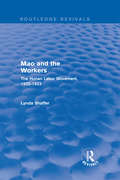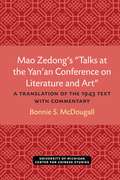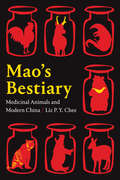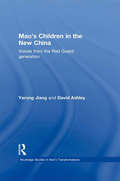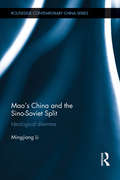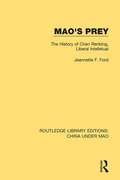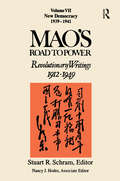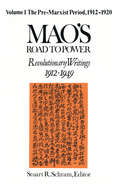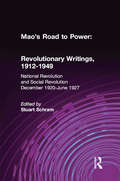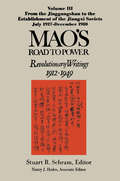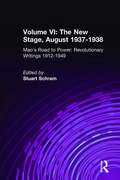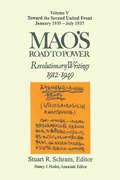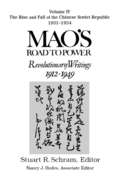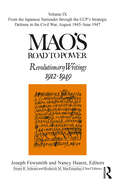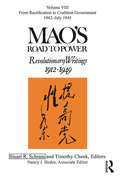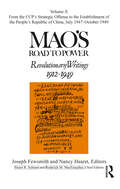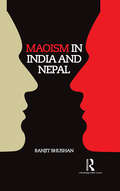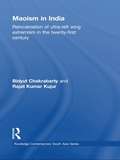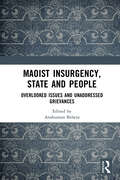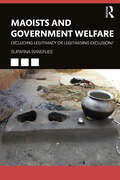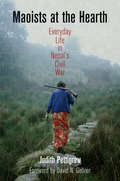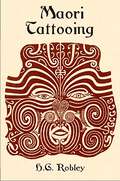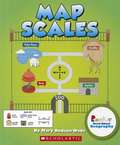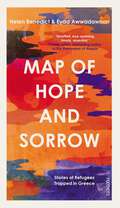- Table View
- List View
Mao Zedong and Workers: The Labour Movement in Hunan Province, 1920-23 (Routledge Revivals)
by Lynda ShafferThis title was first published in 1982:
Mao Zedong’s “Talks at the Yan’an Conference on Literature and Art”: A Translation of the 1943 Text with Commentary (Michigan Monographs In Chinese Studies #39)
by Zedong Mao Bonnie S. McDougallThe writings of Mao Zedong have been circulated throughout the world more widely, perhaps, than those of any other single person this century. The “Talks at the Yan’an Conference on Literature and Art” has occupied a prominent position among his many works and has been the subject of intense scrutiny both within and outside China. This text has undoubted importance to modern Chinese literature and history. In particular, it reveals Mao’s views on such questions as the relationship between writers or works of literature and their audience, or the nature and value of different kinds of literary products. In this translation and commentary, Bonnie S. McDougall finds that Mao was in fact ahead of many of his critics in the West and his Chinese contemporaries in his discussion of literary issues. Unlike the majority of modern Chinese writers deeply influenced by Western theories of literature and society (including Marxism), Mao remained close to traditional patterns of thought and avoided the often mechanical or narrowly literal interpretations that were the hallmark of Western schools current in China in the early twentieth century. Many of the detailed discussions on the “Talks” in the West have been concerned with their political and historical significance. However, since Mao is a literary figure of some importance in twentieth-century China, McDougall finds it worthwhile to follow up his published remarks on the nature and source of literature and the means of its evaluation. By better understanding the complex and revolutionary ideas contained in the “Talks,” McDougall suggests we may acquire the necessary analytical tools for a more fruitful investigation into contemporary Chinese literature.
Mao's Bestiary: Medicinal Animals and Modern China (Experimental Futures)
by Liz P. CheeControversy over the medicinal uses of wild animals in China has erupted around the ethics and efficacy of animal-based drugs, the devastating effect of animal farming on wildlife conservation, and the propensity of these practices to foster zoonotic diseases. In Mao's Bestiary, Liz P. Y. Chee traces the history of the use of medicinal animals in modern China. While animal parts and tissue have been used in Chinese medicine for centuries, Chee demonstrates that the early Communist state expanded and systematized their production and use to compensate for drug shortages, generate foreign investment in high-end animal medicines, and facilitate an ideological shift toward legitimating folk medicines. Among other topics, Chee investigates the craze for chicken blood therapy during the Cultural Revolution, the origins of deer antler farming under Mao and bear bile farming under Deng, and the crucial influence of the Soviet Union and North Korea on Chinese zootherapies. In the process, Chee shows Chinese medicine to be a realm of change rather than a timeless tradition, a hopeful conclusion given current efforts to reform its use of animals.
Mao's Children in the New China: Voices From the Red Guard Generation (Asia's Transformations)
by David Ashley Yarong JiangAround 18 million young Chinese people were sent to the countryside between 1966 and 1976 as part of the Cultural Revolution. Mao's Children in the New China allows some of them to tell their moving stories in their own voices for the first time. In this inspiring collection of interviews with former Red Guards, members of the first generation to be born under Chairman Mao talk frankly about the dramatic changes which have occurred in China over the last two decades. In discussing the impact these changes have had on their own lives, the former revolutionaries give a direct insight into how ex-Maoists view contemporary China, revealing an attitude perhaps more critical than that of most Western commentators. These poignant memoirs tell the very personal stories of how people from all walks of life were affected by both the cultural revolution and Deng Xiaoping's economic reforms. They cover subjects as diverse as marriage and divorce, the privatization of industry, family relationships, universities and the stock market. Mao's Children in the New China is essential reading for all those interested in learning more about the personal and social history of modern China.
Mao's China and the Sino-Soviet Split: Ideological Dilemma (Routledge Contemporary China Series)
by Mingjiang LiThe Sino-Soviet split in the 1960s was one of the most significant events of the Cold War. Why did the Sino-Soviet alliance, hailed by its creators as "unbreakable", "eternal", and as representing "brotherly solidarity", break up? Why did their relations eventually evolve into open hostility and military confrontation? With the publication of several works on the subject in the past decade, we are now in a better position to understand and explain the origins of the Sino-Soviet split. But at the same time new questions and puzzles have also emerged. The scholarly debate on this issue is still fierce. This book, the result of extensive research on declassified documents at the Chinese Foreign Ministry, and on numerous other new Chinese materials, sheds new light on the problem and makes a significant contribution to the debate. More than simply an empirical case study, by theorising the concept of the ideological dilemma, Mingjiang Li’s book attempts to address the relationship between ideology and foreign policy and discusses such pressing questions as why it is that an ideology can sometimes effectively dictate foreign policy, whilst at other times exercises almost no significant influence at all. This book will be of essential reading to anyone interested in Chinese-Soviet history, Cold War history, International Relations and the theory of ideology.
Mao's Prey: The History of Chen Renbing, Liberal Intelletual (Routledge Library Editions: China Under Mao #10)
by Jeannette F. FordThis book, first published in 2001, uses key oral histories to confirm and explain the professional and private lives of post-1949 Chinese intellectuals through the focal point of Chen Renbing, a man personally criticised by Mao Zedong. Intellectuals have faced unique perils in modern Chinese history, thousands of whom were targeted by Mao. Mao’s Prey provides invaluable insight into their experiences and fates.
Mao's Road to Power: Revolutionary Writings 1912-1949: New Democracy (Mao's Road to Power)
by Stuart SchramBy 1939 Mao Zedong was a leader in the Chinese Communist Party through his political acumen, his organizing energy, and his executive ability. At the same time, his abilities to shift register, to maintain a sense of the whole and also of the particular, and to absorb seemingly contradictory realities in the social, political and military arenas he
Mao's Road to Power: Revolutionary Writings, 1912-49 (An\east Gate Book Ser. #Vol. 1)
by Stuart Schram Zedong MaoRevolution in its Leninist guise has been a dominant force in the world for most of the 20th century, and the Chinese revolution has been, with the Russian revolution, one of its two most important manifestations. Mao Zedong, the architect of victory in China in 1949, stands out as one of the dominant figures of the century. Guerilla leader, strategist, conqueror, ruler, poet and philosopher, he placed his imprint on China, and on the world. Even though today communism is widely seen as bankrupt, Mao Zedong's achievements as an innovative disciple of Lenin and Stalin in the most populous nation on earth guarantees his place in history. Whatever the ultimate fate of communism in China, the fact of Mao's influence on events during more than five decades, and its resonance after his death, will remain. This edition of Mao Zedong's writings provides abundant documentation in his own words regarding his life and thought. It has been compiled from all available Chinese sources, including not only the 20-volume edition published in Tokyo years ago, but many new materials issued in China since 1978, both openly and for internal circulation. The editors have pursued a threefold goal: firstly, to translate every text by Mao which could be obtained, so as to make this English version as complete as possible; secondly, to annotate the materials in sufficient detail to make them accessible to the non-specialist reader; and thirdly, to combine accuracy with a level of literary quality which is intended to make the volumes agreeable as well as instructive to read. Volume 1 includes translations of the entire contents of the authoritative "Mao Zedong Zaoqi Wengao 1912.6-1920.11" ("Draft writings from Mao Zedong's early period, June 1912-November 1920"), published in Beijing in 1990, plus some 15 additional texts for the same period which have been attributed to Mao. Among the items thus made available in English are his first surviving work, a middle school essay of 1912 in praise of Shang Yang; his very extensive "Classroom Notes" of late 1913 on the lectures of his most influential teachers, Yang Changji and "Yuan the Big Beard"; a dozen letters to his then close friend Xiao Zisheng (Siao-yu), who described a shared odyssey in "Mao-Tse-tung and I were Beggars"; his marginal annotations of 1918 to the German philosopher Friedrich Paulsen's work on ethics, in which Mao proclaimed himself a believer in "individualism" and an admirer of Nietzsche; and many important letters, articles, and other writings documenting his evolution from liberalism to anarchism and finally to Marxism in 1919-1920.
Mao's Road to Power: Revolutionary Writings, 1912-49 (Mao's Road to Power)
by Stuart Schram Zedong Mao Mao, Tse TungThis projected ten-volume edition of Mao Zedong's writings provides abundant documentation in his own words regarding his life and thought. It has been compiled from all available Chinese sources, including the many new texts that appeared in 1993, Mao's centenary.
Mao's Road to Power: Revolutionary Writings, 1912-49 (Mao's Road to Power)
by Nancy J. Hodes Zedong MaoThis projected ten-volume edition of Mao Zedong's writings provides abundant documentation in his own words regarding his life and thought. It has been compiled from all available Chinese sources, including the many new texts that appeared in 1993, Mao's centenary.
Mao's Road to Power: Revolutionary Writings, 1912-49 (Mao's Road to Power)
by Stuart Schram Zedong MaoBy 1936, after a decade of Civil War and even before the Xi'an Incident, Mao Zedong had begun talking about a "New Stage" of cooperation between the Guomindang and the Communist Party. With the establishment of a framework for cooperation between the two parties, and as Japan began its brutal war against China, Mao began to develop this theme more systematically in both the political and military spheres. This volume documents the evolution of Mao's thinking in this area that found its culmination in his long report to the Sixth Enlarged Plenum of the Central Committee in October, 1938, explicitly entitled "On the New Stage" and presented here in its entirety. It was also during this period that Mao delivered a course of lectures on dialectical materialism after reading and annotating a number of works on Marxist theory by Soviet and Chinese authors. These lectures, from which "On Practice" and "On Contradiction" were later extracted, are also translated here in their entirety.
Mao's Road to Power: Revolutionary Writings, 1912-49 (Mao's Road to Power)
by Stuart Schram Zedong MaoThis projected ten-volume edition of Mao Zedong's writings provides abundant documentation in his own words regarding his life and thought. It has been compiled from all available Chinese sources, including the many new texts that appeared in 1993, Mao's centenary.
Mao's Road to Power: Revolutionary Writings, 1912-49 (Mao's Road to Power)
by Stuart Schram Zedong MaoThis projected ten-volume edition of Mao Zedong's writings provides abundant documentation in his own words regarding his life and thought. It has been compiled from all available Chinese sources, including the many new texts that appeared in 1993, Mao's centenary.
Mao's Road to Power: Revolutionary Writings: Volume IX (Mao's Road to Power)
by Joseph Fewsmith and Nancy HearstThe series, Mao’s Road to Power, consisting of translations of Mao Zedong’s writings from 1912 to 1949, provides abundant documentation in his own words on his life and thought as well as on developments in China during the pre-1949 period. This penultimate volume in the series, Volume 9, covers the period from the Japanese Surrender through the Chinese Communist Party’s Strategic Defense during the Civil War, August 1945 to June 1947.
Mao's Road to Power: Revolutionary Writings: Volume VIII (An\east Gate Book Ser.)
by Timothy Cheek Stuart Schram Roderick MacFarquharThis eighth volume covers the period 1942 to 1945 when Mao asserted his status as the incarnation and symbol of the Chinese Revolution and the sinification of Marxism-Leninism.
Mao's Road to Power: Revolutionary Writings: Volume X (Mao's Road to Power)
by Joseph Fewsmith and Nancy HearstThe series, Mao’s Road to Power, consisting of translations of Mao Zedong’s writings from 1912 to 1949, provides abundant documentation in his own words on his life and thought as well as developments in China during the pre-1949 period. This final volume in the series, Volume 10, covers the period from the Chinese Communist Party’s Strategic Offense during the Civil War to the Establishment of the People's Republic of China, July 1947 to October 1949.
Maoism at the Grassroots: Everyday Life in China's Era of High Socialism
by Jeremy BrownMaoism at the Grassroots challenges state-centered views of China under Mao, providing insights into the lives of citizens across social strata, ethnicities, and regions. It reveals how ordinary people risked persecution and imprisonment in order to assert personal beliefs and identities, despite political repression and surveillance.
Maoism in India and Nepal
by Ranjit BhushanWhy are Maoist, Naxalite and Left extremist movements taking root in the most backward and underdeveloped regions of South Asia? This book examines this multi-layered question in democracies such as India and Nepal through an analysis of these movements as well as their leaderships and ideologies. Through a series of detailed interviews and dialogues, it sheds fresh light into the minds and actions of people who have critically defined the nature of Maoism and related movements in the region. Weaving together diverse narratives, voices, and streams of dissent, this first-of-its-kind volume brings cohesion to the seemingly fragmented but formidable Maoist politics in South Asia. It also highlights how such ‘civil wars’ are embedded into the larger politics of the region. Perceptive and lucid, this book will be of great interest to scholars and researchers of politics, sociology, peace and conflict studies, and security studies, especially those concerned with Maoism and social movements. It will also be useful to government institutions and policy-makers.
Maoism in India: Reincarnation of Ultra-Left Wing Extremism in the Twenty-First Century (Routledge Contemporary South Asia Series)
by Bidyut Chakrabarty Rajat Kumar KujurThe rise of Maoism as one of the organized political movement in India is the outcome of a historical situation. Both colonialism and the failure of the Indian state to implement land reforms more stringently in the aftermath of independence resulted in terrible sufferings of the marginalized, land- dependent, sections of society. Through historical analysis, this book assesses the ideological articulation of the contemporary ultra-left movement in India, including Maoism which is expanding gradually in India. The author provides answers to the following issues: Is Maoism reflective of the growing disenchantment of the people in the affected areas with the state? Is it a comment on ‘the distorted development planning’ pursued by the Indian state? Is this an outcome of the processes of ‘deepening of democracy’ in India? Using Orissa as a case study, the book raises questions on India’s development strategy. The author argues that Maoism provides critical inputs for an alternative paradigm for development, relevant for ‘transitional societies’ and that it is a still a powerful ideology for the poorer parts of the world although its ideological appeal has declined internationally.
Maoist Insurgency, State and People: Overlooked Issues and Unaddressed Grievances
by Anshuman BeheraThis book critically studies descriptive, normative and ethical aspects of violence to understand the Maoist conflict in India. It studies important but often overlooked issues such as reasons for youth participation in insurgency, the reality and the rhetoric of the urban Maoism debate, rights and entitlements of the local communities and their interactions with the Maoist conflict, and issues of governance and development. The volume, - examines the origins of Maoist insurgency, why it continues, the factions, counterinsurgency, impact of violence on education and other development indicators; - investigates how a conflict with an alternative idea of democracy violently clashes with an established democratic Indian state; - deals with the critical aspects of the Maoist movement in India and the status of Urban Maoism or Urban Naxal; - evaluates state responses to the movement and its impact on the economic status of affected communities; - discusses the gender dimension of armed conflict through a feminist lens and explores how women navigate through varied socio-cultural and gender norms while participating in the conflict. Studying a wide range of critical issues, this volume will be of interest particularly to scholars of political science, development studies, public administration, security studies, peace and conflict studies and human rights.
Maoists and Government Welfare: Excluding Legitimacy or Legitimising Exclusion?
by Suparna BanerjeeThis book systematically analyses state responses towards Maoism in India and studies the role of state policies in prolonging conflict. It looks at how the structural maladies that once gave rise to conflict have now found a place in the government responses meant to address it. The book studies the socio-political conditions of Adivasis and lower caste groups that make up large sections of the cadre and highlights the exclusionary nature of the Indian political landscape. It discusses various themes such as state legitimacy, the political landscape through exclusion, the agency of Maoist foot soldiers, limitations of government welfare responses, and the idea of the marginalised in India. Rich in empirical data, the book will be useful for scholars and researchers of development studies, political studies, political sociology, minority studies, exclusion studies, sociology and social anthropology. It will also be of interest to policy-makers.
Maoists at the Hearth
by David Gellner Judith PettigrewThe Maoist insurgency in Nepal lasted from 1996 to 2006, and at the pinnacle of their armed success the Maoists controlled much of the countryside. Maoists at the Hearth, which is based on ethnographic research that commenced more than a decade before the escalation of the civil war in 2001, explores the daily life in a hill village in central Nepal, during the "People's War." From the everyday routines before the arrival of the Maoists in the late 1990s through the insurgency and its aftermath, this book examines the changing social relationships among fellow villagers and parties to the conflict.War is not an interruption that suspends social processes. Life in the village focused as usual on social challenges, interpersonal relationships, and essential duties such as managing agricultural work, running households, and organizing development projects. But as Judith Pettigrew shows, social life, cultural practices, and routine activities are reshaped in uncertain and dangerous circumstances. The book considers how these activities were conducted under dramatically transformed conditions and discusses the challenges (and, sometimes, opportunities) that the villagers confronted.By considering local spatial arrangements and their adaptation, Pettigrew explores people's reactions when they lost control of the personal, public, and sacred spaces of the village. A central consideration of Maoists at the Hearth is an exploration of how local social tensions were realized and renegotiated as people supported (and sometimes betrayed) each other and of how villager-Maoist relationships (and to a lesser extent villager-army relationships), which drew on a range of culturally patterned preexisting relationships, were reforged, transformed, or renegotiated in the context of the conflict and its aftermath.
Maori Tattooing
by H. G. RobleyOriginally published in 1896, this classic of ethnography was assembled by a skilled illustrator who first encountered Maori tattoo art during his military service in New Zealand. Maori tattooing (moko) consists of a complex design of marks, made in ink and incised into the skin, that communicate the bearer's genealogy, tribal affiliation, and spirituality. This well-illustrated volume summarizes all previous accounts of moko and encompasses many of Robley's own observations. He relates how moko first became known to Europeans and discusses the distinctions between men and women's moko, patterns and designs, moko in legend and song, and the practice of mokomokai: the preservation of the heads of Maori ancestors. Features 180 black-and-white illustrations.
Map Scales
by Mary Dodson WadeBecause maps can be used to provide such a variety of information, they can also vary widely in scale. Readers will discover how to use a maps key to determine its scale. They will also learn how scales can be used to measure distances.
Map of Hope and Sorrow: Stories of Refugees Trapped in Greece
by Helen Benedict Eyad AwwadawnanThe stories of refugees who fled violence or persecution only to become trapped in the worst refugee camps in Europe.Helen Benedict, award-winning British-American professor of journalism at Columbia University, teams up with Syrian writer and refugee, Eyad Awwadawnan, to present the stories of five refugees who have endured long and dangerous journeys from the Middle East and Africa to Greece. Hasan, Asmahan, Evans, Mursal and Calvin each tell their story, tracing the trajectory of their lives from homes and families in Syria, Afghanistan, Nigeria and Cameroon to the brutal refugee camps, where they are trapped in a strange and hostile world. These are compelling, first-person stories of resilience, suffering and hope, told in a depth rarely seen in non-fiction, partly because one of the authors is a refugee himself, and partly because both authors spent years getting to know the interviewees and winning their trust. The women and men in this book tell their stories in their own words, retaining control and dignity, while revealing intimate and heartfelt scenes from their lives.
